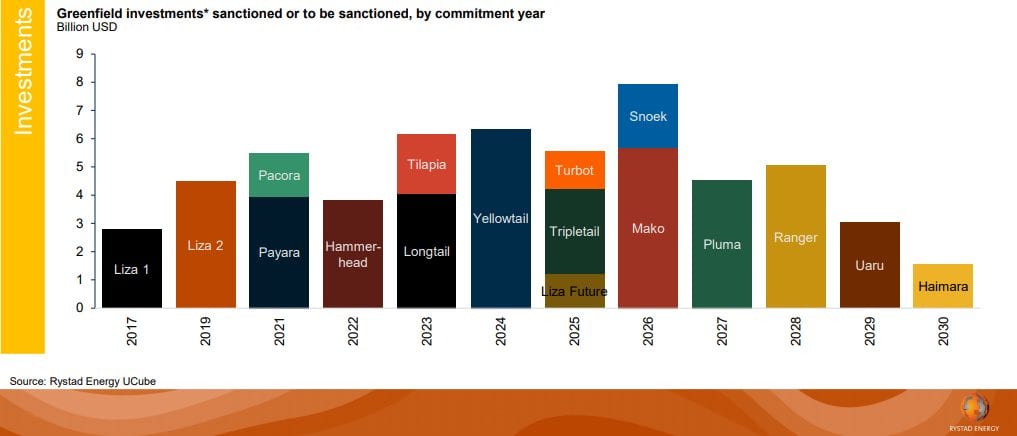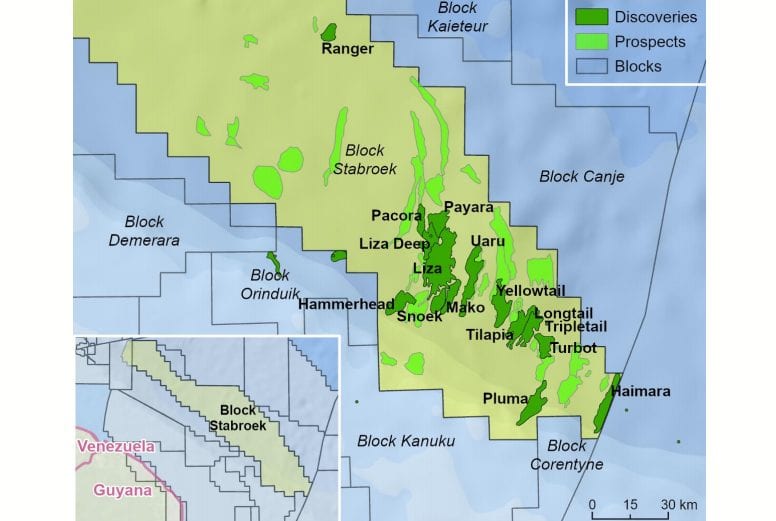Guyana’s positive economic outlook even in face of the coronavirus pandemic is based on the development of several billion barrels of discovered oil resources and the impact this is expected to have on the economy. Should these resources remain in the discovered state with no value to be derived from their development, Guyana’s outlook would be adversely affected.
So far, ExxonMobil has only been able to sanction two FPSOs on Liza, while the remaining 14 discoveries remain undeveloped. Norway-based Rystad Energy said the 14 discoveries, which collectively hold recoverable reserves of nearly 7 billion barrels of oil equivalent, could be sanctioned for development over the next 10 years.
Overall, Rystad Energy believes these fields would require around $50 billion in greenfield expenditure (spending from project sanctioning to first oil).

“If you look at Guyana in a wider sense, there are only two discoveries out of the 16 discoveries that have been made that are sanctioned and ready to produce which are Liza Phase One and Liza Phase Two,” explained Schreiner Parker, Rystad Energy’s Vice President for Latin America and the Caribbean. “So, if you were to kind of take the idea that…only these two assets have been sanctioned – Liza 1 and Liza 2 – and that’s all that’s ever going to happen, then all of the forecasts about the growth and the Guyanese GDP and job creation are kind of thrown out the window.”

He said out of the remaining 14 discoveries, “you’re talking about seven billion barrels of oil that are sitting in a ‘discovered’ classification. Discovered means only that it has been found, but it has no inherent value if it is not able to be produced.”
The VP said the dangers with delays in sanctioning are that policies change, politics change and there could be a refocusing of effort both from the Guyana side of things or on the operator side of things, and if these discoveries get left in the ground then there is no economic advantage to them at all, neither for the operator nor for the government.
“So, the goal of exploration is to make a discovery, and the goal of making a discovery is to turn that asset into a producing asset that is able to generate revenue,” Parker told OilNOW in a recent interview.
He pointed out that Guyana will be at a disadvantage if a situation develops where projects cannot be sanctioned in a timely manner, thereby causing both the oil companies and the country to lose out on the value of the discoveries that have been made.
“Of course, the operator loses the money that they’ve invested to make the discoveries, but the people of Guyana lose the revenue that is associated with the profit oil and with the royalty income. So, it’s a matter of not being able to capitalise on a resource that is there but has to be sanctioned to produce in order to make money,” Parker stated.
He further explained that delays in project sanctioning could result in a domino effect on the indirect jobs that are created during an oil boom.
“So, one example would be hotel workers. Another example would be restaurateurs. A third example would be construction firms. A fourth example could be lawyers, litigators,” he said.
Parker stressed that there is a heavy knock-on effect that an oil boom has on the economy that brings jobs that are not necessarily on the drill ships or on the rigs themselves but are tangentially associated with the oil boom and the pick-up of investment.
With a new President sworn in and government being put in place in Guyana, it is anticipated that delays in project approvals due to political uncertainty over the last several months will soon be addressed and measures put in place to move forward with offshore developments.



